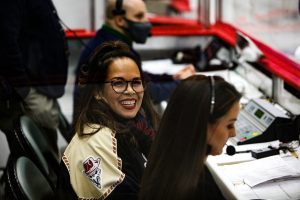- Slug: Sports-Latina PA Announcer, 1,620 words.
- 4 photos available.
Eds: An earlier version of this story misstated the nickname of the former Phoenix International Hockey League affiliate in the fifth graf. The correct name is “Roadrunners.” The story below has been corrected, but clients who used previous versions are asked to run the correction found here.
By Hannah Bronkema
Cronkite News
PHOENIX – Although Kim Cota-Robles is not the first woman to serve as a public address announcer for a North American professional hockey team, she is believed to be the only Latina full-time PA announcer in the sport’s pro history.
This season is her first, and she is one of two announcers employed by the Tucson Roadrunners, the Arizona Coyotes’ top minor league affiliate. It is a franchise very much tuned into the Hispanic community. The Coyotes’ Xavier Gutierrez is the NHL’s first Latino team president and CEO and has said he iss interested in more consistently courting the 43 percent of the Tucson community that identifies as Latino or Hispanic.
Cota-Robles is an important fixture in the organization as well.
Paving the way
Before there was Cota-Robles, there was Ann Craig-Cinnamon and Sari Zalesin.
Craig-Cinnamon, a local Indianapolis broadcaster, became the first female to serve as a public address announcer when she took the microphone on November 24, 1989, for the Indianapolis Ice. The Ice, at the time, were the International Hockey League affiliate of the Chicago Blackhawks and, ironically enough, were facing off against the Phoenix Roadrunners. Although she only announced one game, Craig-Cinnamon opened the door for women to gain PA opportunities in the sport.
Zalesin became the first female NHL public address announcer on October 5, 1993, when she took the mic for the Dallas Stars after the team relocated from Minnesota to Texas. Zalesin quickly became a hot topic of conversation as she found herself surrounded by naysayers who believed women “should be cheerleaders … not sports writers, play-by-play announcers or PA announcers,” according to an article about Zalesin in the Detroit Free Press.
Despite the hardships faced by those who came before her, Cota-Robles’ daughter, Megan, said her mother has “always been a woman in a male dominated industry, no matter what career she decides to have at that point in time.”
College years
A fourth-generation Tucsonian, Cota-Robles attended the University of Arizona where she obtained a Bachelor of Fine Arts in three disciplines – media arts, theater and arts and creative writing.
During her time at Arizona, Cota-Robles was a photographer for the Arizona Daily Wildcat student newspaper. She often photographed basketball and football games, avoiding hockey at all costs.
In fact, Cota-Robles was an “unwilling participant” in her first hockey game, only going because her editor threatened to take away basketball and football coverage if she did not cover the sport.
All it took was one game and she was hooked.
“I remember being completely overwhelmed by how amazing it was,” Cota-Robles said. “As the game was happening and I was right there seeing everything, I realized immediately how amazing hockey was. How fast it was, how much effort and skill it takes to be a hockey player.”
Despite her love of the game, Cota-Robles was still wary about breaking into journalism as a photographer after watching her then-boyfriend struggle in the field after graduation.
It was during her time at a conference in El Paso for the National Association of Hispanic Journalists that the trajectory of Cota-Robles’s career changed entirely.
Forged by the sea
Her encounter with an ex-marine-turned-editor in El Paso led Cota-Robles to Navy ROTC recruiter Aaron Armstrong. After their meeting, Cota-Robles enrolled in the ROTC program the following semester.
After graduating from UArizona, Cota-Robles spent six weeks on the USS Stennis, getting a feel for what the fleet was like before she was commissioned into the Navy and stationed in Pensacola, Florida, where she trained to be an aviation maintenance officer.
While Cota-Robles recalls her work as an aviation maintenance officer as “intense,” her brother, Steven, said her tenacity and intelligence helped her to adapt quickly.
“She’s kind of a badass,” Steven said. “If she wants something, she goes for it. She’s always been a go-getter and she’s always looked at adversity or people telling her she can’t do something as fuel for the fire.”
This zest for life bolstered her career as she moved from San Diego to Whidbey Island, Washington, then to Japan and, finally, all the way back to where it began, at the University of Arizona. Here she was a recruiter, but she quickly recognized that she was no longer on a good track for her rank.
D.C. and motherhood
Cota-Robles relocated to Washington D.C., after accepting an active duty position from 1999-2010, where she worked in diversity initiatives for the Secretary of the Navy.
Fond of the job, at just 26 she was responsible for $5 million budgets as well as individuals based in four different countries. Although the tour was only supposed to last a year, Cota-Robles did three tours in D.C. before she knew it was time to go off active duty.
The decision was a “no brainer” as Cota-Robles was a mother to a newborn, a daughter named Megan.
“I was going to have to be promotable to Commander because I was Lieutenant Commander at the time,” Cota-Robles said. “ To be promotable to Commander and to be comparable to my contemporaries, I would have had to do two sea tours. And that would have been, you know, four to six years. And I had a newborn. So that was not really something that I considered.”
Cota-Robles and her daughter stayed in D.C. for just one more year as she continued work in the area as a contractor for the Washington Navy Yard. Here Cota-Robles welcomed another new member to the family, a boy named Maximilliano – Max for short.
It wasn’t until the family of three visited Tucson in 2010 for Christmas that Cota-Robles began to realize something was wrong.
Difficult news
Cota-Robles’ mother, Anna Cota-Robles, was sick.
The matriarch was diagnosed with Idiopathic Pulmonary Fibrosis, a chronic, progressive lung disease that causes scar tissue (fibrosis) to build up in the lungs, making them unable to effectively transport oxygen into the bloodstream.
Unaware of the life expectancy that came along with the diagnosis, it had only been one day since Cota-Robles and her children had traveled back to D.C. when her brother Steven called, notifying her of their mother’s rapid deterioration.
“I came back, and brought my daughter with me,” Cota-Robles said. “By the time I got here, she was already in a coma and then she was in the hospital for about two weeks. There was just nothing that they could do. Her lungs were just too far gone and then she, she passed.”
Cota-Robles marked the death of her mother as the “absolute worst time” in her life. The event conceptualized the desire for her to be close to extended family, and soon she and her children moved back to Tucson.
Upon returning, she found herself rotating between multiple jobs. She eventually landed a long-term position in 2018 at Banner-University Medical Center as a physician recruiter, where she still works.
“When I was in the Navy, I realized that I just wanted to be part of something bigger. I wanted to contribute to the greater good. And I do that at Banner,” Cota-Robles said. “I feel like it’s much smaller. Obviously, it’s just in Tucson. But I feel like I’m bringing good physicians, good nurse practitioners, to Tucson.”
In between juggling jobs, the mother of three earned her MBA from UArizona. It was during her second time at the university that she was introduced to the prospect of voice acting.
A new frontier
Desperate to retain valuable information needed for her classes, Cota-Robles began voice recording herself in different accents, two to be exact.
“There were three different things we had to memorize and so I made three different voice memos,” Cota-Robles said. “I had done a British accent at one point, like to have some fun, and I had done a southern accent, too, and I was listening to them and then I was like, ‘Well, you know, I should probably share these with people.’ Maybe somebody can get something good out of this also.”
The next time she attended class, classmates were stunned to hear that the voice behind the memos was in fact Cota-Robles. So stunned that one of them suggested that “if they had a voice like hers, they wouldn’t be getting their MBA right now. They would be a voice actor.”
Having never considered work as a voice actor, the opportunity manifested itself as Cota-Robles received an email from the Jewish Community Center notifying her of an upcoming “how to break into voice acting” web seminar.
Cota-Robles ended up attending the seminar and eventually signed up for voice acting lessons. After spending a little over a year building her brand, she started making cold calls to businesses, with the Tucson Roadrunners at the top of her list.
Procrastinating for over a year, Cota-Robles finally sent an email to Bob Hoffman, president of the Tucson Roadrunners.
Attached in the three-sentence email was a thirty second radio promo complete with music and sound effects. A few hours after receiving it, Hoffman responded, inviting Cota-Robles to “talk hockey” with him over coffee.
The talk lasted for 30 minutes and in that time Hoffman invited Cota-Robles to audition to be the Roadrunners PA announcer.
So she did. A week later she was offered the job.
“She’s like my own superhero. To me, she can do anything. And she has proven time and time again that she can,” Megan Cota-Robles said. “She’s incredibly determined. She’s incredibly witty. I’ve never met a single person who doesn’t absolutely adore her. She’s incredibly personable. And she’s also just very, very kind. She has a very, very good heart, which I think is very admirable.”
Making history and impressing hockey fans, Cota-Robles’ voice can be heard throughout Tucson Arena during the 2021-2022 Tucson Roadrunners season.
For more stories from Cronkite News, visit cronkitenews.azpbs.org.


